Discover the treasure trove of the most common English vocabulary for places!
English vocabulary about places forms the foundation of daily communication. Whether you're traveling, shopping, or simply describing your neighborhood, these words appear in every conversation. In this comprehensive guide, PREP compiles 100 essential English vocabulary words for places in the city, complete with pronunciation guides, meanings, and real-world examples. Master these terms to boost your confidence in English conversations and excel in your language exams.
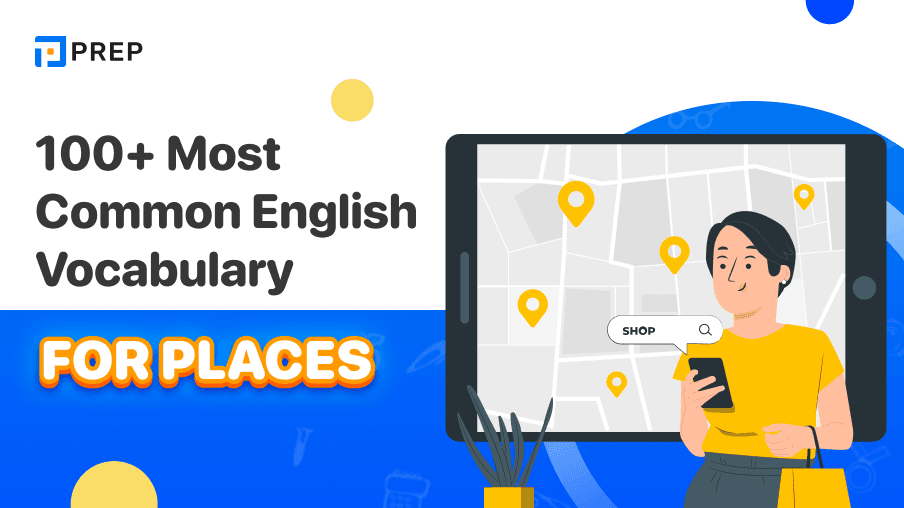
I. Compilation of English vocabulary for places in the city
Master the essential vocabulary that forms the foundation of urban navigation and daily communication. These words appear frequently in IELTS Speaking and Writing tasks, making them crucial for exam success.
1. English vocabulary for locations on the street
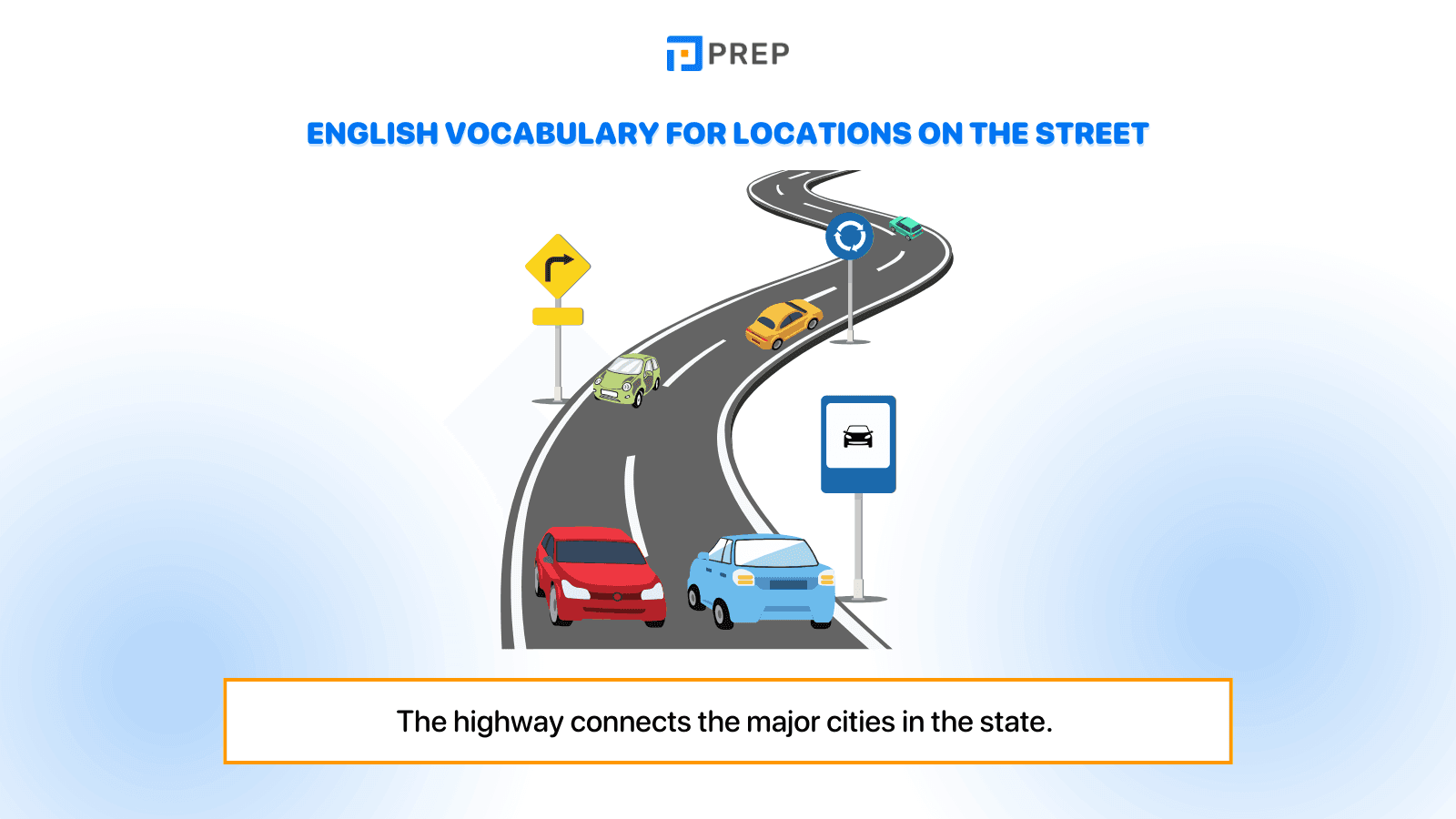
|
Places vocabulary in English |
||
|
Vocabulary |
Meaning |
Example |
|
Avenue /’ævinju:/ |
a wide road with trees or tall buildings on both sides, or a wide country path or road with trees on both sides |
I live on Elm avenue, which is a beautiful street lined with trees. |
|
Freeway /ˈfriːweɪ/ |
a wide road for fast-moving traffic, especially in the US, with a limited number of places at which drivers can enter and leave it |
We took the freeway to get to the airport. |
|
Highway /ˈhaɪweɪ/ |
a public road, especially an important road that joins cities or towns together |
The highway connects the major cities in the state. |
|
Downtown /ˈdaʊntaʊn/ |
in or to the central part of a city |
Let's meet at the downtown for a cup of coffee. |
|
Pavement /’peivmənt/ |
a path with a hard surface on one or both sides of a road, that people walk on |
The children were riding their bikes on the pavement while the adults walked on the sidewalk. |
|
Signpost /ˈsaɪn.pəʊst/ |
a pole at the side of a road, especially at a point where two or more roads meet, that gives information about routes and distances |
The signpost at the intersection pointed us in the direction of the nearest gas station. |
|
Square /skweə/ |
an area of approximately square-shaped land in a city or a town, often including the buildings that surround it |
The town's central square is a popular gathering place for events. |
|
Street /stri:t/ |
a road in a city or town that has buildings that are usually close together along one or both sides |
I live on Maple street, just a few blocks away from the park. |
|
Telephone box /ˈtɛlɪfəʊn bɒks/ |
a phone box |
There used to be a red telephone box on the corner, but it was removed last year. |
|
Taxi rank /ˈtæksi ræŋk/ |
a place where taxis wait for customers |
The taxi rank outside the train station is always busy with people looking for a ride. |
|
Side street /saɪd striːt/ |
a minor or subsidiary street |
I prefer taking the side streets instead of the main road because they're less crowded. |
|
High street /haɪ striːt/ |
a street where the most important shops and businesses in a town are |
The high street is lined with shops and boutiques, offering a variety of shopping options. |
|
Old Quarter /əʊld ˌˈkwɔː.tər/ |
the historic, traditional old town or downtown district of a city, an area that has preserved its original |
The old quarter of the city is filled with historic buildings. |
|
Pedestrian subway /pɪˈdɛstriən ˈsʌbweɪ/ |
an underground passage that allows people on foot to cross a busy road |
To cross the busy road safely, pedestrians can use the pedestrian subway located underneath. |
|
Crosswalk /ˈkrɒswɔːk/ |
a place on a road, especially one where there is a lot of traffic, at which vehicles must stop to allow people to walk across the road |
Always remember to use the crosswalk when crossing the street to ensure your safety. |
|
Bus stop /bʌs stɒp/ |
a place, usually with a pole with a sign, where a bus stops to allow passengers to get on and off |
The bus stop is just around the corner, so we don't have to walk far to catch the bus. |
|
Bus shelter /bʌs ˈʃɛltə/ |
a place to wait for buses that has a roof |
It started raining, so we took shelter in the bus shelter. |
|
Station /ˈsteɪʃᵊn/ |
a building and the surrounding area where buses or trains stop for people to get on or off |
The train station is a bustling hub where people come and go throughout the day. |
|
Corner street /ˈkɔːnə striːt/ |
the point, area, or line that is formed by the meeting of two lines, surfaces, roads, etc. |
The bakery is located on the corner street, right next to the park entrance. |
2. English vocabulary for outdoor locations
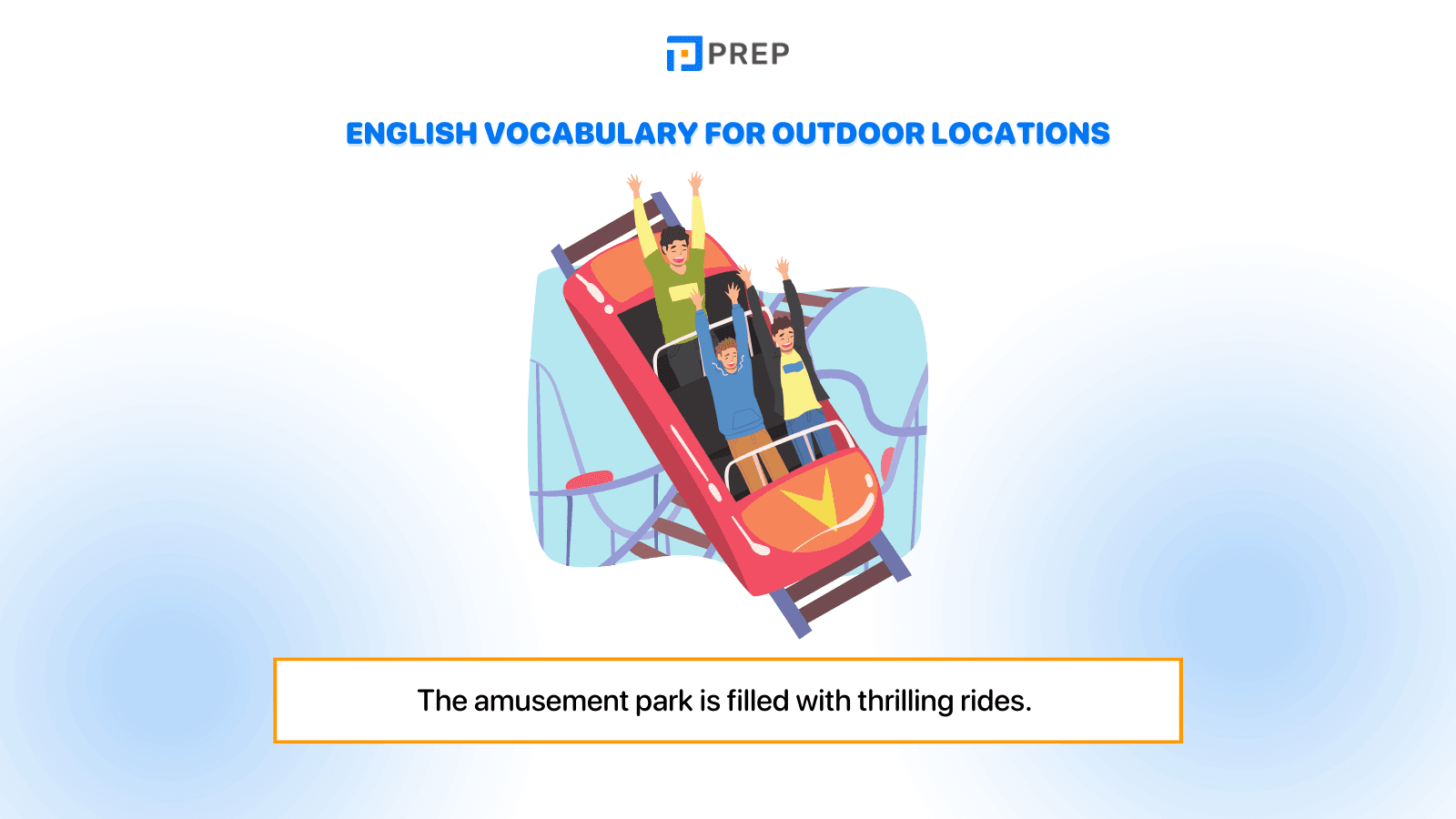
|
Places vocabulary in English |
||
|
Vocabulary |
Meaning |
Example |
|
Amusement park /əˈmjuːz.mənt ˌpɑːk/ |
a large permanent area for public entertainment, with entertaining activities and big machines to ride on or play games on, restaurants, etc., sometimes all connected with a single subject |
The amusement park is filled with thrilling rides. |
|
Campsite /ˈkæmp.saɪt/ |
a piece of land where people on holiday can camp, usually with toilets and places for washing/ a place for one tent at a place where people stay in tents |
We set up our tents at the campsite near the lake. |
|
Zoo /zuː/ |
an area in which animals, especially wild animals, are kept so that people can go and look at them or study them |
The zoo houses a wide variety of animals from around the world. |
|
Historic monument /hɪˈstɒr.ɪ ˌˈmɒn.jə.mənt/ |
an old building or place that is an important part of a country's history |
The historic monument attracts tourists from far and wide. |
|
Playground /ˈpleɪ.ɡraʊnd/ |
an area designed for children to play in outside, especially at a school or in a park |
The children had a great time playing on the swings at the neighborhood playground. |
|
Castle /ˈkæsəl/ |
a large strong building, built in the past by a ruler or important person to protect the people inside from attack |
The medieval castle is located atop the hill. |
|
Palace /pælɪs/ |
a large house that is the official home of a king, queen, or other person of high social rank |
The grand palace was once the residence of the royal family. |
|
Garden /ɡɑrdən/ |
a piece of land next to and belonging to a house, where flowers and other plants are grown, and often containing an area of grass |
The botanical garden is a peaceful oasis with lush greenery. |
|
Forest /fɔrɪst/ |
a large area of land covered with trees and plants, usually larger than a wood, or the trees and plants themselves |
We went hiking in the dense forest. |
|
Island /aɪlənd/ |
a piece of land completely surrounded by water |
The tropical island boasts pristine beaches and crystal-clear waters. |
|
Countryside /kʌntrisaɪd/ |
land not in towns, cities, or industrial areas, that is either used for farming or left in its natural condition |
The countryside is characterized by picturesque farms. |
|
Outskirts /ˈaʊt.skɜːts/ |
the areas that form the edge of a town or city |
The hotel is located on the outskirts of the city. |
|
Monument /mɒnjʊmənt/ |
a structure or building that is built to honour a special person or event |
The towering monument commemorates the bravery of those who fought in the war. |
|
Temple /tɛmpl/ |
a building used for the worship of a god or gods in some religions |
This ancient temple is a place of worship. |
|
Harbor /hɑːrbər/ |
an area of water next to the coast, often protected from the sea by a thick wall, where ships and boats can shelter |
The bustling harbor is filled with fishing boats. |
|
Waterfall /wɔːtərfɔːl/ |
water, especially from a river or stream, dropping from a higher to a lower point, sometimes from a great height |
We hiked through the forest to reach the majestic waterfall. |
|
Volcano /vɒlˈkeɪnoʊ/ |
a mountain with a large, circular hole at the top through which lava (= hot liquid rock) gases, steam, and dust are or have been forced out |
The active volcano is a popular tourist attraction. |
|
Cave /keɪv/ |
a large hole in the side of a hill, cliff, or mountain, or one that is underground |
We explored the dark and mysterious cave. |
|
Aquarium /əˈkwɛriəm/ |
a building, usually open to the public, that holds many aquariums |
The aquarium showcases a wide range of marine species. |
|
Coast /kəʊst/ |
the land next to or close to the sea |
The rugged coast is known for its picturesque cliffs. |
|
Port /pɔːt/ |
a town by the sea or by a river that has a harbour, or the harbour itself |
The bustling port serves as a hub for international trade and welcomes ships from around the world. |
|
Stadium /ˈsteɪ.di.əm/ |
a large closed area of land with rows of seats around the sides and often with no roof, used for sports events and musical performances |
The stadium is packed with enthusiastic fans. |
|
Desert /dezərt/ |
an area, often covered with sand or rocks, where there is very little rain and not many plants |
The vast desert stretches as far as the eye can see with its golden sand dunes. |
|
Jungle /dʒʌŋɡəl/ |
a tropical forest in which trees and plants grow very closely together |
The dense jungle is teeming with exotic wildlife. |
|
Plateau /ˈplætəʊ/ |
a large flat area of land that is high above sea level |
The plateau is home to unique plant and animal species adapted to the altitude. |
|
Hill /hɪl/ |
an area of land that is higher than the surrounding land |
We climbed to the top of the hill to enjoy a breathtaking sunset. |
|
Beach /biːʧ/ |
an area of sand or small stones near the sea or another area of water such as a lake |
The sandy beach is a popular spot for sunbathing and swimming. |
|
Bridge /brɪʤ/ |
a structure that is built over a river, road, or railway to allow people and vehicles to cross from one side to the other |
The iconic bridge spans across the river. |
3. English vocabulary for stores
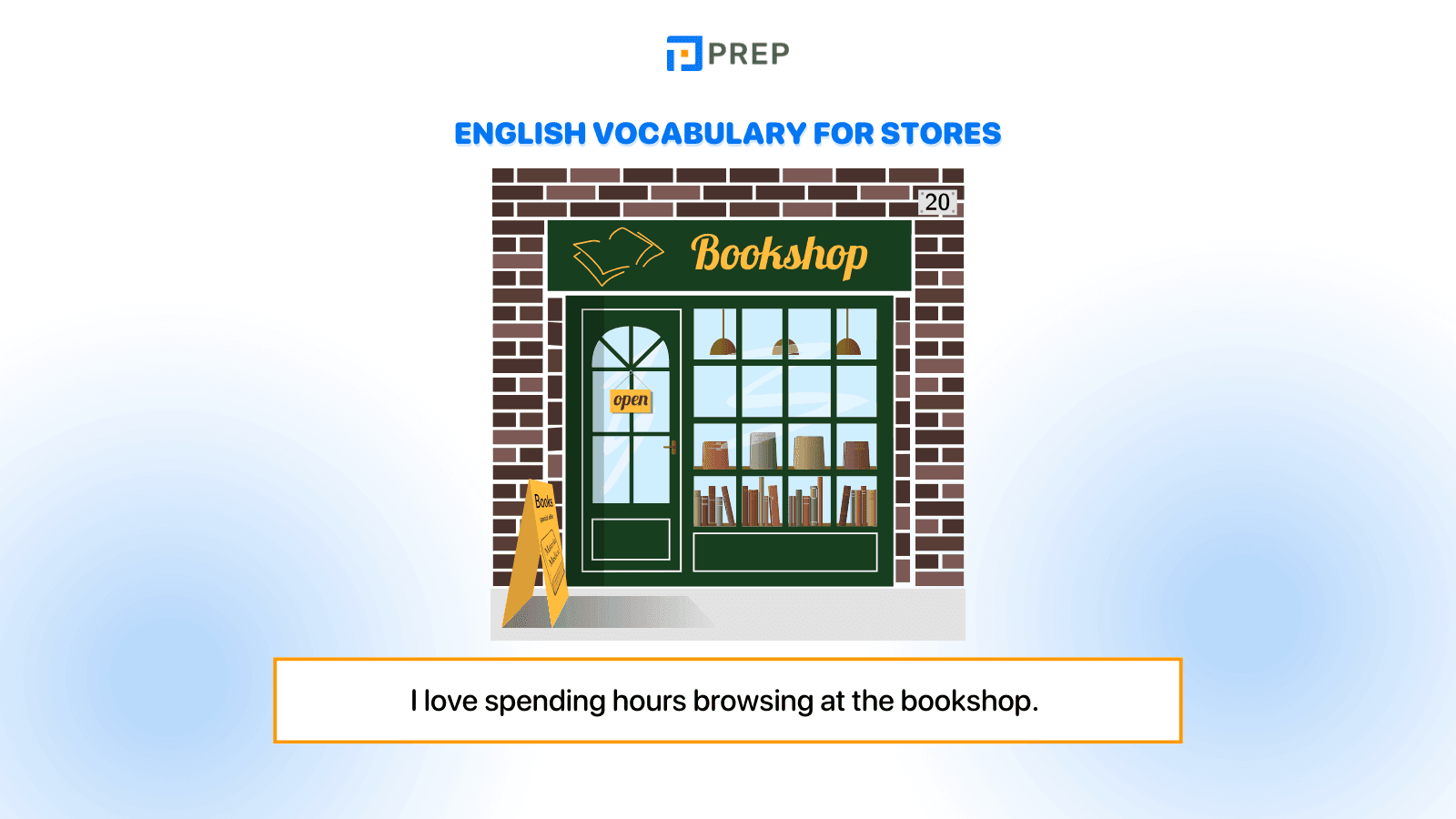
|
Places vocabulary in English |
||
|
Vocabulary |
Meaning |
Example |
|
Bakery /’beikəri/ |
a place where bread and cakes are made and sometimes sold |
I bought fresh bread from the bakery this morning. |
|
Bookshop /’buk∫ɔp/ |
a shop or website where books are sold |
I love spending hours browsing at the bookshop. |
|
Butcher /ˈbʊʧə/ |
a person who sells meat in a shop |
The butchers have great selections of meats. |
|
Delicatessen /,delikə’tesn/ |
a small shop that sells high-quality foods, such as types of cheese and cold cooked meat, often from other countries, and, especially in the United States, sandwiches made using these foods |
I picked up some delicious sandwiches from the delicatessen. |
|
Florist /ˈflɒrɪst/ |
a person who works in a shop that sells cut flowers and plants for inside the house |
I bought a bouquet of flowers from the florists for my mother. |
|
Kiosk /’kiɔsk/ |
a small building where things such as chocolate, drinks, or newspapers are sold through an open window |
I grabbed a quick snack from the kiosk at the train station. |
|
Newsagent /ˈnjuːzˌeɪʤ(ə)nts/ |
a shop that sells newspapers and magazines, as well as some foods and things that people often buy such as cigarettes |
I read the latest newspaper from the newsagent. |
|
Launderette /,lɔ:ndə’ret/ |
a place where you pay to use machines that wash and dry clothes |
I need to do laundry, so I'm heading to the launderette. |
|
Stationer /ˈsteɪʃnə/ |
a store that sells stationery |
I need some pens and notebooks, so I'll visit the stationers. |
|
Tattoo parlour /təˈtuː ˈpɑːlə/ |
a dedicated studio or shop where professional tattoo artists work and create custom tattoos for clients |
My friend got a new tattoo at the tattoo parlour. |
|
Toy shop /tɔɪ ʃɒp/ |
a retail store that specializes in selling a variety of toys, games, and playthings for children |
I bought a toy for my nephew from the toy shop. |
|
Sports shop /spɔːts ʃɒp/ |
a retail store that specializes in selling a variety of sporting goods, athletic equipment, and accessories |
Jenny needs new running shoes, so she'll visit the sports shop. |
|
Pet shop /pɛt ʃɒp/ |
a retail store that specializes in selling a variety of pets, pet supplies, and related products |
I bought food and toys for my dog from the pet shop. |
|
Shoe shop /ʃuː ʃɒp/ |
a retail establishment that specializes in the sale of footwear and related accessories |
I found a great pair of boots at the shoe shop. |
|
Second-hand clothes store /ˈsɛkənd-hænd kləʊðz stɔː/ |
a retail establishment that specializes in selling used, pre-owned clothing and accessories |
I love a vintage dress from the second-hand clothes store. |
|
Off-licence /ɒf ˈlaɪsᵊns/ |
a shop that sells mainly alcoholic drinks to be taken away and drunk at home |
I stopped by the off-license to pick up a bottle of wine for dinner. |
|
Gift shop /ɡɪft ʃɒp/ |
a shop that sells goods that are suitable for giving as presents |
I found a cute keychain at the gift shop. |
|
General store /ˈʤɛnᵊrᵊl stɔː/ |
a shop that sells a wide range of products, often the only shop in a village |
I bought groceries and household supplies at the general store. |
|
Estate agent /ɪˈsteɪt ˌeɪ.dʒənt/ |
a business that arranges the selling, renting or management of homes, land and buildings for the owners |
I'm meeting with estate agents to discuss buying a new house. |
|
Garden center /ˈɡɑːr.dən ˌsen.t̬ɚ/ |
a place where you can buy things such as plants and equipment for growing them |
I visited the garden center to select some flowers and plants for my garden. |
|
Fishmonger /ˈfɪʃˌmʌŋ.ɡər/ |
a shop that sells fish |
The fishmonger recommended a fresh salmon for dinner. |
|
Dry cleaner /ˌdraɪˈkliː.nə/ |
a store where clothes are cleaned with chemicals |
I dropped off my suit at the dry cleaners to have it cleaned. |
|
Clothing store /ˈkləʊðɪŋ stɔː/ |
a retail establishment that specializes in the sale of new, brand-name clothing and related fashion accessories |
Hanna went shopping at the clothing store. |
|
Department store /dɪˈpɑːt.mənt ˌstɔːr/ |
a large shop divided into several different parts, each of which sells different things |
The department store is having a sale on electronics this weekend. |
|
Charity shop /ˈtʃær.ɪ.ti ˌʃɒp/ |
a shop in which a charity sells all types of used goods that are given by the public, or in which they sell new goods, to make money for the work of the charity |
I donated some old books to the charity shop. |
|
Pharmacy /ˈfɑː.mə.si/ |
a shop or part of a shop in which medicines are prepared and sold |
I need to pick up my prescription from the pharmacy. |
|
Pub /pʌb/ |
a place, especially in Great Britain or Ireland, where alcoholic drinks can be bought and drunk and where food is often available |
Let's meet at the pub for a drink tonight. |
|
Wine bar /ˈwaɪn ˌbɑːr/ |
a bar or small restaurant that serves mainly wines |
We went to a wine bar and enjoyed a glass of red wine. |
4. English buildings vocabulary
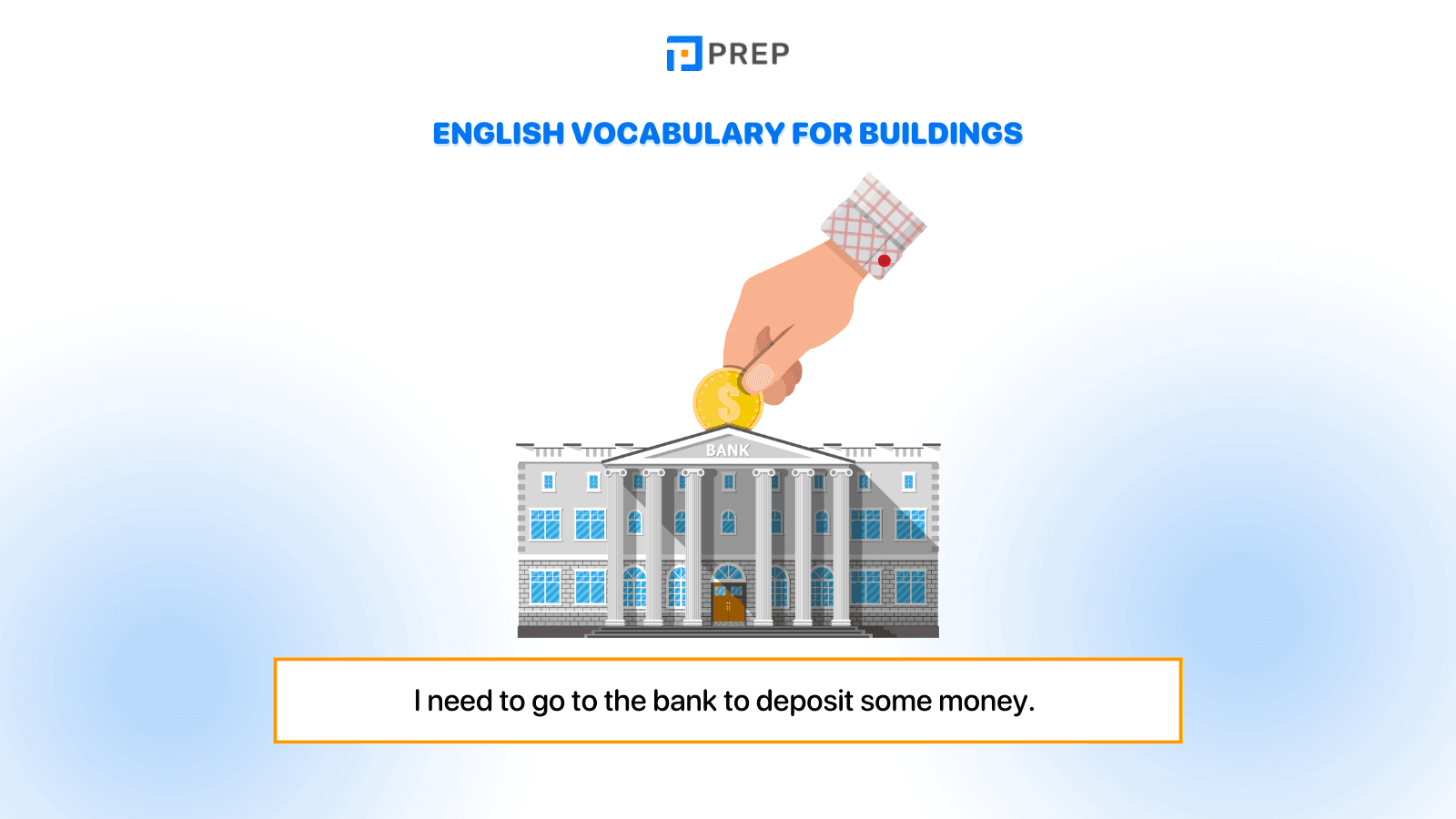
|
Places vocabulary in English |
||
|
Vocabulary |
Meaning |
Example |
|
apartment building /əˈpɑːt.mənt ˌbɪl.dɪŋ/ |
a large building that is divided into apartments |
The new apartment building has a swimming pool and a gym. |
|
bank /bæŋk/ |
an organization where people and businesses can invest or borrow money, change it to foreign money, etc., or a building where these services are offered |
I need to go to the bank to deposit some money. |
|
cathedral /kəˈθiː.drəl/ |
a very large, usually stone, building for Christian worship. It is the largest and most important church of a diocese |
The cathedral in the city is a popular tourist attraction. |
|
church /tʃɜrtʃ/ |
a building for Christian religious activities |
We attend church every Sunday. |
|
cinema /ˈsɪn.ə.mɑː/ |
a theatre where people pay to watch films |
Let's go to the cinema and watch the latest movie. |
|
dentist's /ˈden.tɪst/ |
the place where a dentist carries out their job |
I have an appointment at the dentist's for a teeth cleaning. |
|
fire station /ˈfaɪə ˌsteɪ.ʃən/ |
a building where fire engines are kept and where firefighters work and stay in the hours they are working |
The fire station is located just a few blocks away from here. |
|
health centre /ˈhelθ ˌsen.tər/ |
a building in which several doctors have offices and where people go to visit them |
The health centre provides various medical services to the community. |
|
hospital /ˈhɒs.pɪ.təl/ |
a place where people who are ill or injured are treated and taken care of by doctors and nurses |
She was admitted to the hospital for surgery. |
|
hotel /həʊˈtel/ |
a building where you pay to have a room to sleep in, and where you can sometimes eat meals |
We booked a room at the hotel for our vacation. |
|
library /ˈlaɪ.brər.i/ |
a building, room, or organization that has a collection of books, documents, music, and sometimes things such as tools or artwork, for people to borrow, usually without payment |
I borrowed some books from the library for my research. |
|
museum /mjuːˈziː.əm/ |
a building where objects of historical, scientific, or artistic interest are kept |
The museum exhibits artifacts from ancient civilizations. |
|
office building /ˈɒf.ɪs ˌbɪl.dɪŋ/ |
a large building that contains offices |
The company's headquarters is located in a modern office building. |
|
petrol station /ˈpet.rəl ˌsteɪ.ʃən/ |
a place where fuel is sold for road vehicles, often with a small shop |
I need to stop at the petrol station to fill up the tank. |
|
police station /pəˈliːs ˌsteɪ.ʃən/ |
the local office of the police in a town or part of a city |
I reported the incident at the police station. |
|
post office /ˈpəʊst ˌɒf.ɪs/ |
a place where stamps are sold and from where letters and parcels are sent |
I need to buy some stamps at the post office. |
|
shopping centre /ˈʃɒp.ɪŋ ˌsen.tər/ |
a large building or a group of buildings containing a lot of different stores |
The new shopping centre has a wide range of stores and restaurants. |
|
skyscraper /ˈskɑɪˌskreɪ·pər/ |
a very tall modern building, usually in a city |
The city skyline is dominated by towering skyscrapers. |
|
theatre /ˈθɪə.tər/ |
a building, room, or outside structure with rows of seats, each row usually higher than the one in front, from which people can watch a performance or other activity |
We bought tickets to see a play at the theatre. |
|
tower block /ˈtaʊə ˌblɒk/ |
a tall building divided into apartments or offices |
She lives on the 20th floor of a tower block. |
|
town hall /ˌtaʊn ˈhɔːl/ |
a building in which local government officials and employees work and have meetings |
The town hall is hosting a community meeting tonight. |
|
arts museum /ɑːts/ /mju(ː)ˈzɪəm/ |
a type of cultural institution that is dedicated to the collection, preservation, study, and public display of various forms of visual art |
The arts museum displays a wide range of paintings. |
|
science museum /ˈsaɪəns/ /mju(ː)ˈzɪəm/ |
a type of museum that is primarily focused on educating the public about science, technology, engineering, and mathematics (STEM) disciplines through interactive exhibits and educational programming |
This science museum has a section dedicated to astronomy. |
5. English vocabulary for educational locations
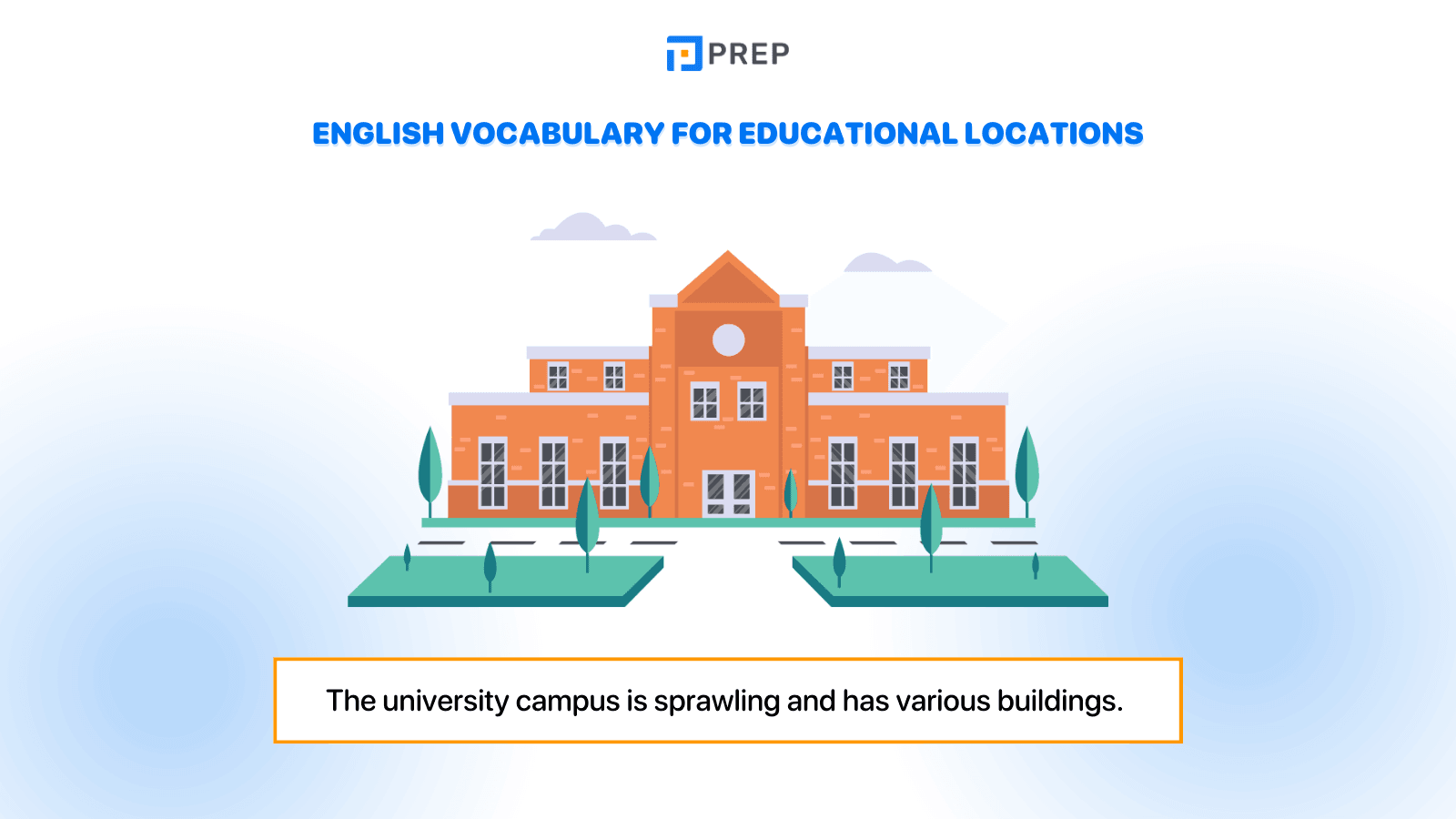
|
English vocabulary for places |
||
|
Vocabulary |
Meaning |
Example |
|
school /skuːl/ |
a place where children go to be educated |
My children go to a local school in the neighborhood. |
|
university /ˌjuː.nɪˈvɜː.sə.ti/ |
a place where people study for an undergraduate (= first) or postgraduate (= higher level) degree |
He is studying engineering at the university. |
|
classroom /ˈklɑːs.ruːm/ |
a room in a school or college where groups of students are taught |
The students are sitting quietly in the classroom. |
|
kindergarten /ˈkɪn.dəˌɡɑː.tən/ |
a class for young children, usually children four and five years old, which is often the first year of formal education |
My niece attends a kindergarten. |
|
campus /ˈkæm.pəs/ |
the buildings of a college or university and the land that surrounds them |
The university campus is sprawling and has various buildings. |
|
dormitory /ˈdɔː.mɪ.tər.i/ |
a large room containing many beds, for example in a boarding school |
The dormitory provides accommodation for students who live on campus. |
|
primary school /ˈpraɪməri ˌskuːl/ |
a school for children from the ages of about five to nine, or an elementary school |
My son is excited to start primary school next year. |
|
high school /ˈhaɪ ˌskuːl/ |
a school for children who are about 15 to 18 years old that is usually divided into grades nine through twelve or ten through twelve |
After graduating from middle school, she enrolled in a prestigious high school in the city. |
|
middle school /ˈmɪd.əl ˌskuːl/ |
a school for children between the ages of about 10 and 14 |
|
|
vocational school /vəʊˈkeɪ.ʃən.əl ˌskuːl/ |
a school where students learn skills that involve working with their hands |
He decided to attend a vocational school to learn practical skills in automotive repair. |
|
Boarding school /ˈbɔː.dɪŋ ˌskuːl/ |
a school equipped with rooms where its students live instead of living in their own homes |
The boarding school provides an environment for students to live and study away from home. |
II. Some English vocabulary to describe places
1. English vocabulary to describe the position of places
Precise location descriptions eliminate confusion and create clear mental maps for your listeners. These expressions prove particularly valuable in giving directions, describing neighborhoods, and explaining geographical relationships between places.
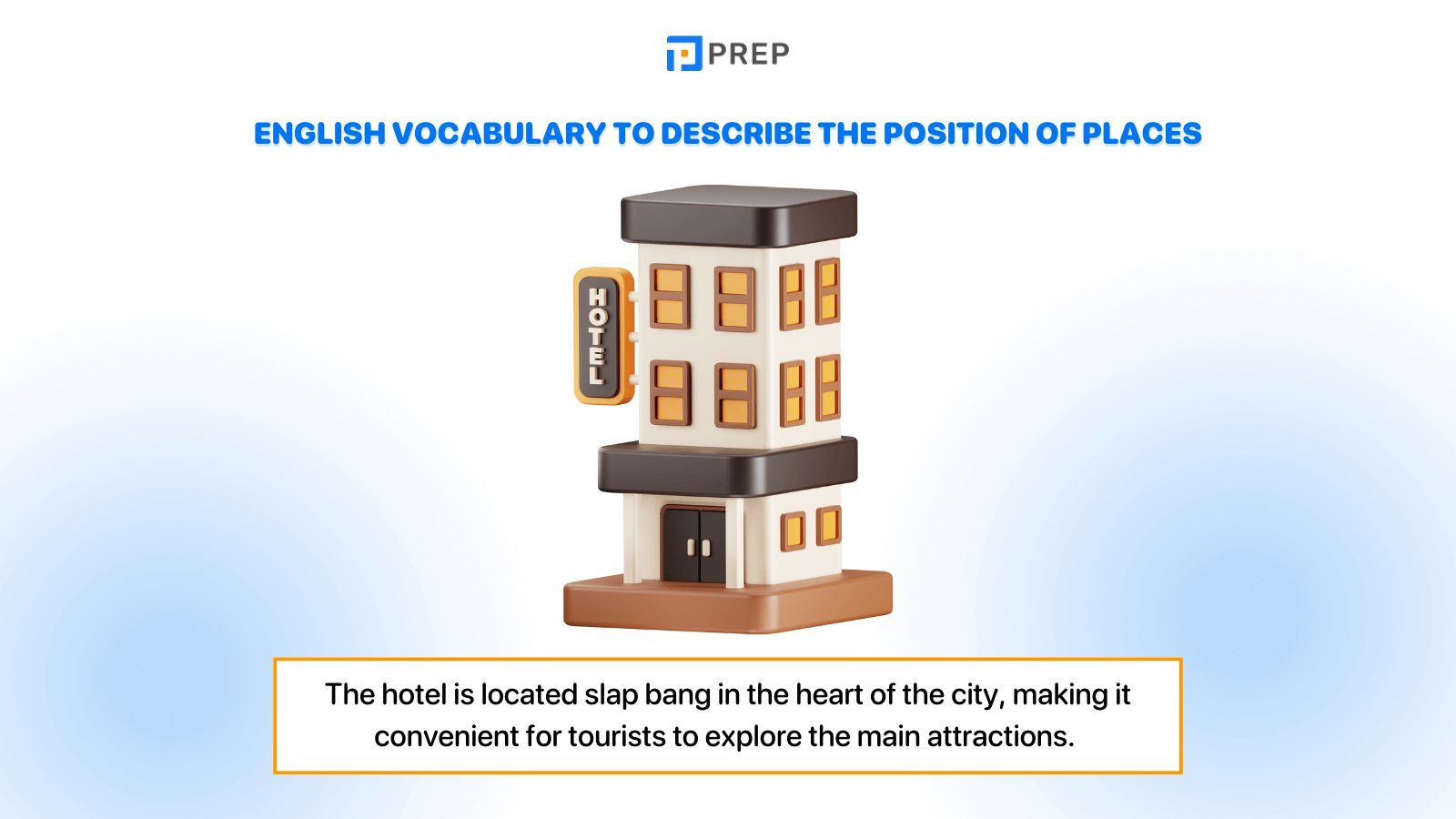
|
English vocabulary for places |
|
|
Vocabulary |
Example |
|
Slap bang in the heart of the city = right in the city center |
The hotel is located slap bang in the heart of the city, making it convenient for tourists to explore the main attractions. |
|
To be/ located within walking distance of somewhere |
The apartment is located within walking distance of the beach, so we can easily go for a swim whenever we want. |
|
In the suburbs/ in the outskirts of the city |
They live in a house in the suburbs, away from the noise and congestion of the city center. |
|
In the north of |
The national park is located in the north of the country. |
|
In the south of |
The famous vineyards are situated in the south of this region. |
|
In the central region of |
Hue, a city rich in history and culture, is located in the central region of Vietnam. |
2. English vocabulary to describe the attractiveness of places
These powerful adjectives and phrases help you convey the emotional impact of beautiful places and create compelling descriptions that resonate with your audience.
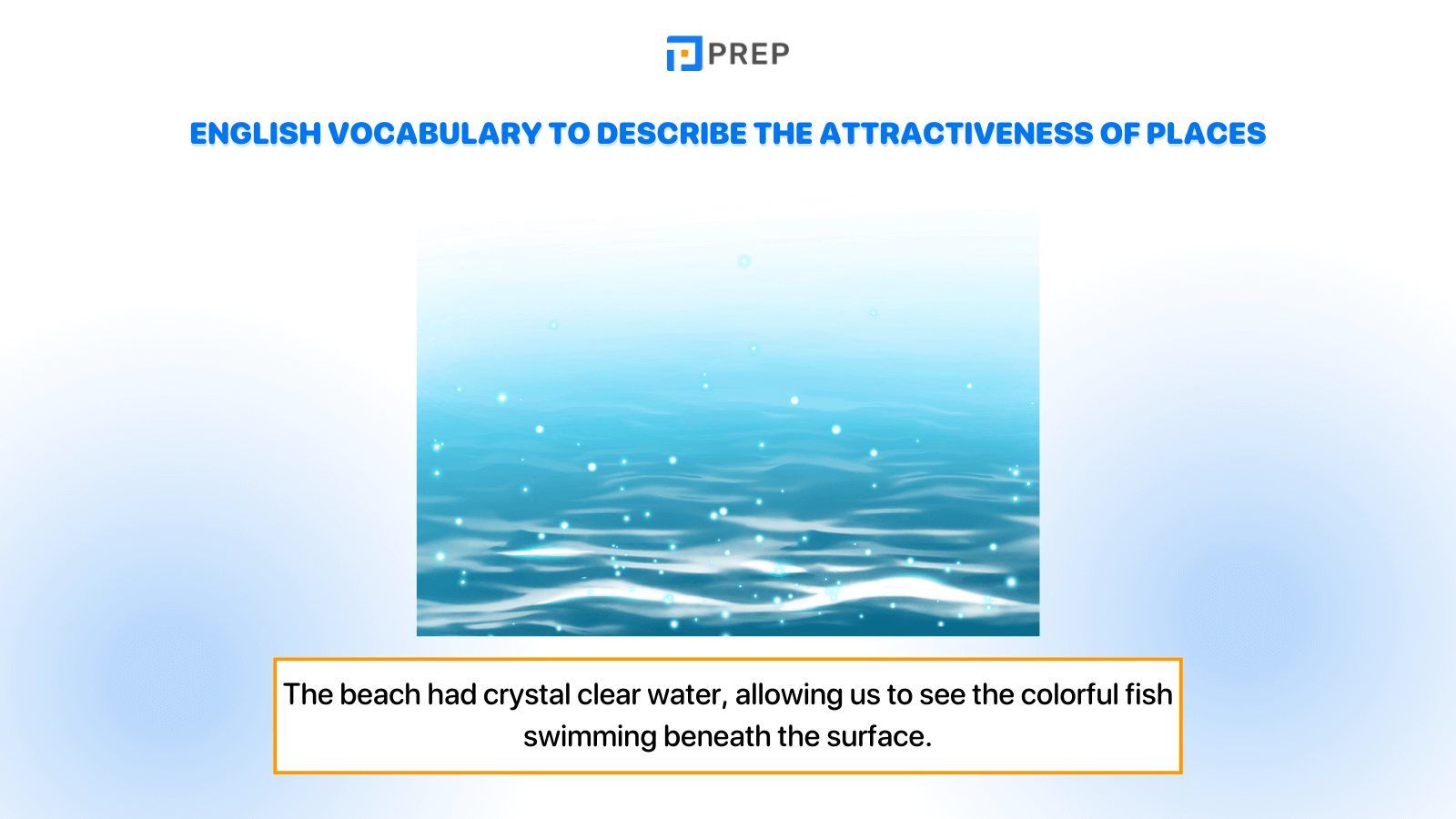
|
English vocabulary for places |
||
|
Vocabulary |
Meaning |
Example |
|
Stunning /ˈstʌnɪŋ/ |
extremely beautiful or attractive |
The view from the mountaintop was absolutely stunning with breathtaking vistas of the surrounding valleys. |
|
Breathtaking /ˈbreθteɪkɪŋ/ |
extremely exciting, beautiful, or surprising |
|
|
Take one’s breath away |
to be extremely beautiful or surprising |
Standing on the Ha Long bay, the sheer magnitude and beauty of the natural wonder took my breath away. |
|
Crystal clear water /ˌkrɪstl ˈklɪə(r) ˈwɔːtə(r) / |
The beach had crystal clear water, allowing us to see the colorful fish swimming beneath the surface. |
|
V. Some English idioms about places
Idiomatic expressions demonstrate your advanced English proficiency. These phrases add authenticity to your speech and help you sound more natural in conversations about places and travel experiences.
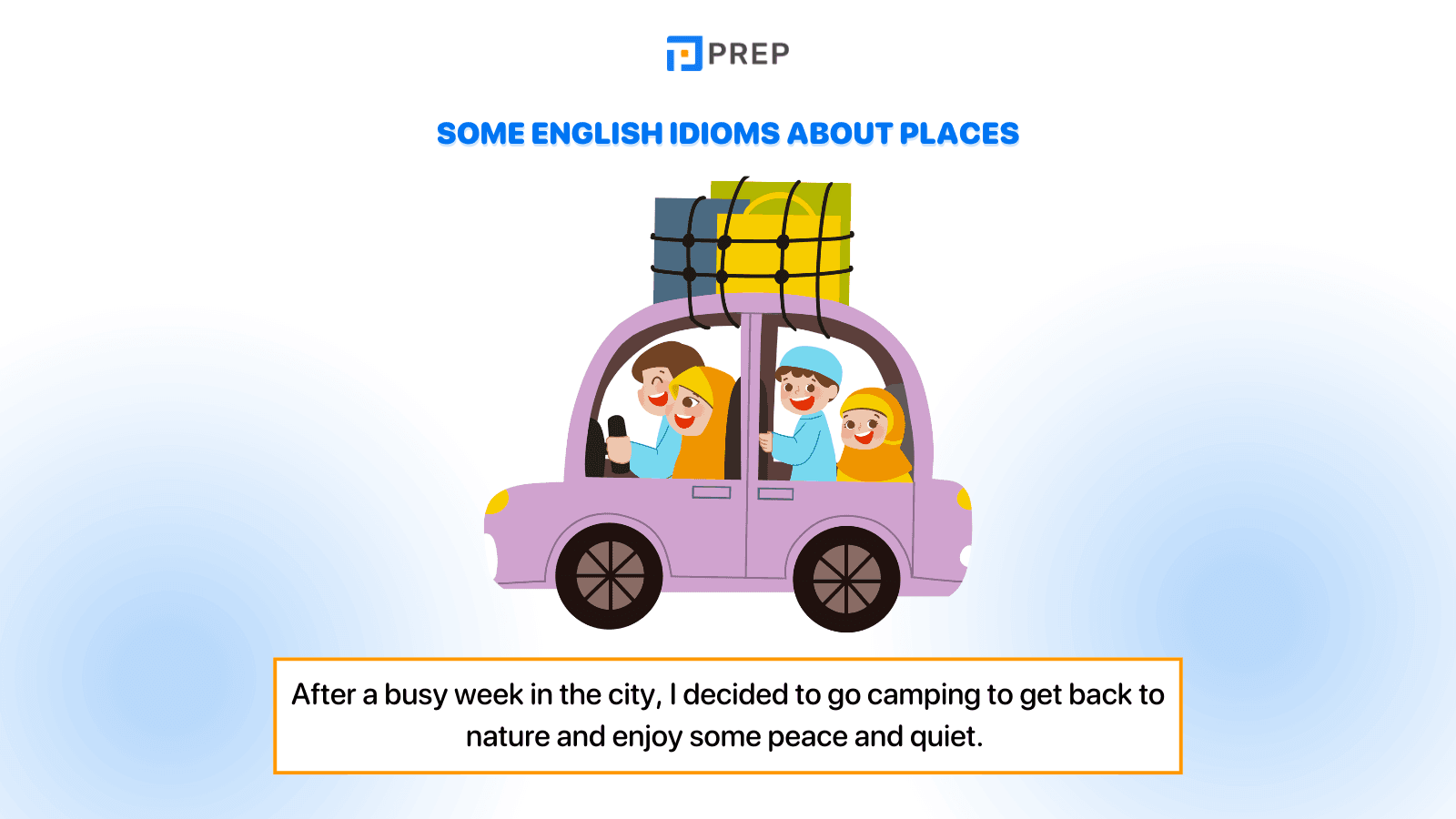
|
Idioms |
Meaning |
Example |
|
land of milk and honey |
a country where living conditions are good and people have the opportunity to make a lot of money |
California is often referred to as the land of milk and honey due to its abundance of opportunities and resources. |
|
Go/ Get back to nature |
to start living a more simple life, often in the country |
After a busy week in the city, I decided to go camping to get back to nature and enjoy some peace and quiet. |
|
the sticks |
an area in the countryside that is far from a town or city |
My grandparents live in a small village in the sticks, far away from the hustle and bustle of the city. |
|
In the middle of nowhere |
far away from any towns and cities and where few people live |
The cabin we rented for our vacation was located in the middle of nowhere, surrounded by dense forests. |
|
Lose one’s bearings |
to become confused about where you are |
As I wandered through the maze-like streets, I quickly lost my bearings and couldn't find my way back. |
|
Take a shortcut |
to travel along a route that is faster or more direct than the customary or original one |
If we take a shortcut through the park, we can reach the cinema in half the time. |
|
Take the scenic route |
to go a way that is not the fastest way but that has beautiful scenery |
Take the scenic route: Instead of taking the highway, let's take the scenic route along the coast to enjoy the beautiful views. |
|
A blot on the landscape |
something such as an ugly building that spoils a pleasant view |
The abandoned factory is a blot on the landscape, spoiling the otherwise picturesque view of the countryside. |
|
On the town |
enjoying yourself by going to places of entertainment in a town or city |
We decided to go out on the town and explore the local nightlife of the vibrant city. |
|
Concrete jungle |
a modern city or urban area, especially when perceived as an unpleasant or challenging place to live |
Manhattan is known as a concrete jungle, with its towering skyscrapers and limited green spaces. |
|
A stone’s throw (away/from) |
a short distance |
The beach is just a stone's throw away from our hotel, so we can easily walk there. |
VI. Common English communication phrases about locations
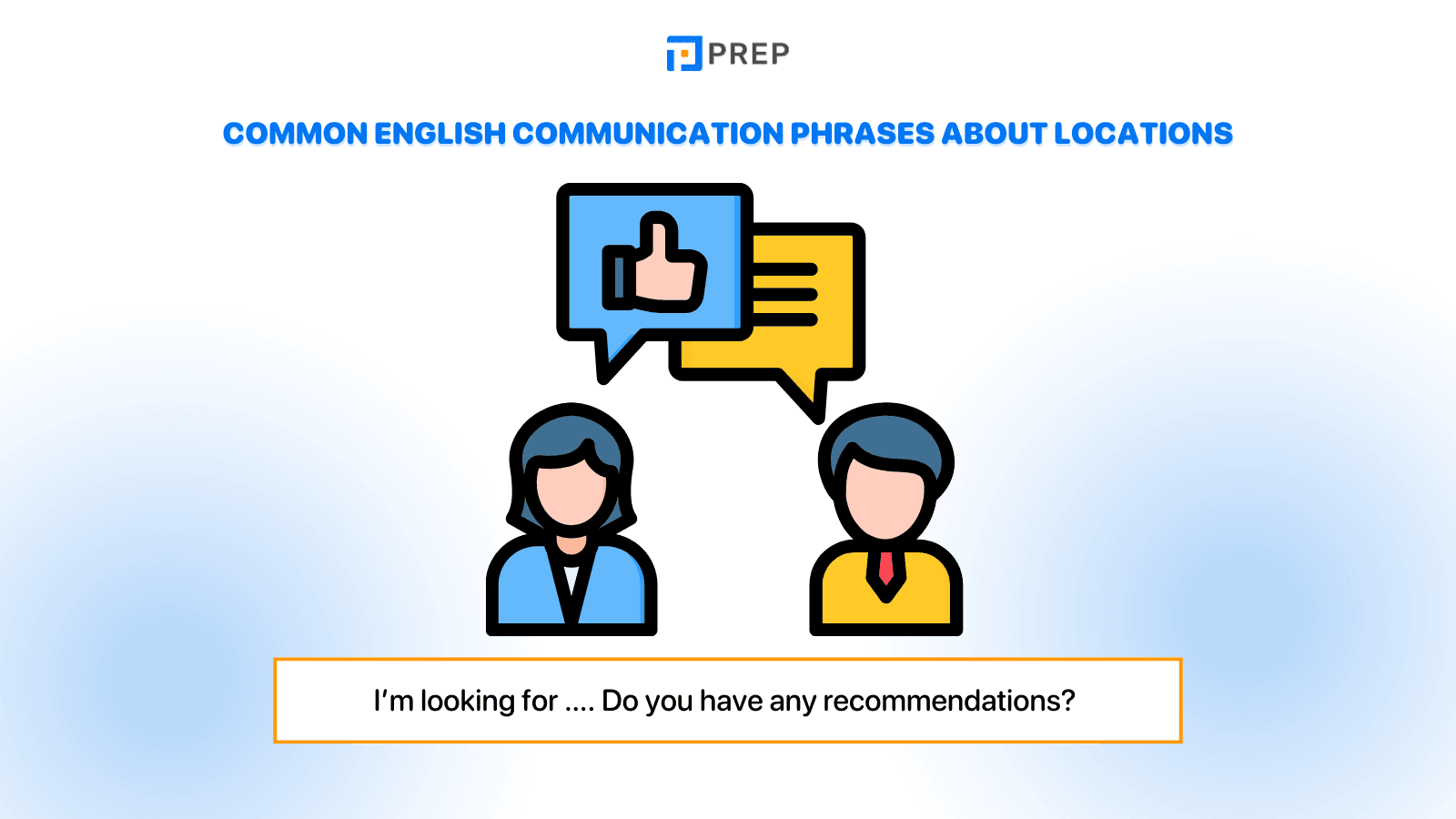
Practical phrases bridge the gap between vocabulary knowledge and real-world application. These essential expressions equip you with the tools needed for successful navigation, travel communication, and everyday interactions involving places and directions.
-
Excuse me, where is …?
-
How can I get to …?
-
What’s the best way to … from here?
-
How do I get to … from here?
-
Where is the nearest …?
-
Could you tell me how to get to …?
-
Is/Are there … around here?
-
I’m looking for …. Do you have any recommendations?
-
Can you direct me to …?
VII. Common mistakes to avoid
1. Preposition errors
|
Incorrect |
Correct |
Explanation |
|
At the corner of the street |
On the corner of the street ✓ |
Use "on" for street corners |
|
In the airport |
At the airport ✓ |
Use "at" for arrival/departure points |
|
I live on Main Street 25 |
I live at 25 Main Street ✓ |
Use "at" with specific addresses |
2. Article usage
|
Incorrect |
Correct |
Explanation |
|
I work in hospital |
I work in the hospital ✓ |
Use "the" for specific places |
|
He's at the university |
He's at university ✓ |
No article when referring to the institution generally |
|
She's going to the church |
She's going to church ✓ |
No article for regular activities |
This guide has provided you with a comprehensive collection of English vocabulary about the most widely used place-related topics in everyday life, along with additional idiomatic expressions and conversational examples utilizing English vocabulary for places. Using this resource for effective studying and test preparation! Wishing you tremendous success!

Hi I'm Chloe, and I am currently serving as an Product Content Administrator at Prep Education. With over five years of experience in independent online IELTS study and exam preparation, I am confident in my ability to support learners in achieving their highest possible scores.
Comment
Premium content
View allPersonalized roadmap
Most read












